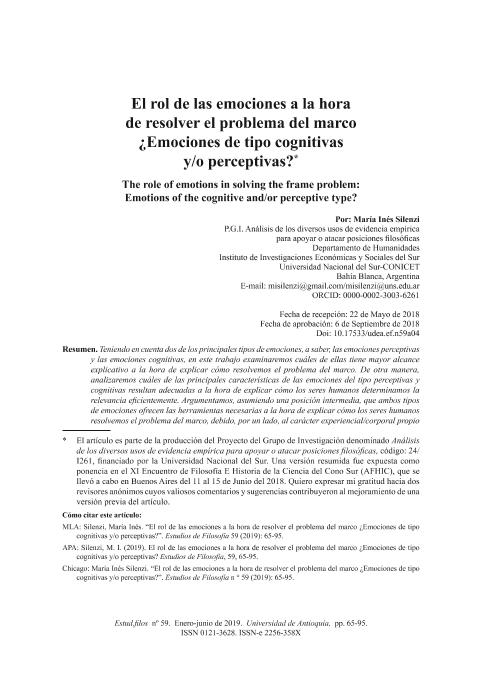Mostrar el registro sencillo del ítem
dc.contributor.author
Silenzi, María Inés

dc.date.available
2020-04-20T15:26:49Z
dc.date.issued
2019-01
dc.identifier.citation
Silenzi, María Inés; El rol de las emociones a la hora de resolver el problema de marco : ¿Emociones de tipo cognitivas y/o perceptivas?; Universidad de Antioquia. Instituto de Filosofía; Estudios de Filosofía; 59; 1-2019; 65-95
dc.identifier.issn
0121-3628
dc.identifier.uri
http://hdl.handle.net/11336/103012
dc.description.abstract
Teniendo en cuenta dos de los principales tipos de emociones, a saber, las emociones perceptivas y las emociones cognitivas, en este trabajo examinaremos cuáles de ellas tiene mayor alcance explicativo a la hora de explicar cómo resolvemos el problema de marco, entendido éste como un problema de relevancia. De otra manera, pondremos en cuestión cuáles de las principales características de las emociones del tipo perceptivas y cognitivas resultan adecuadas a la hora de explicar cómo los seres humanos determinamos relevancia eficientemente. Argumentamos, asumiendo una posición intermedia, que ambos tipos de emociones resultan ?equipadas? a la hora de explicar cómo los seres humanos resolvemos el problema de marco debido, por un lado, al carácter experiencial/corporal propio de las emociones de tipo perceptivas y, por otro lado, a la relación que las emociones de tipo cognitivas establecen con el logro de objetivos frente a una situación determinada.
dc.description.abstract
Considering two of the main types of emotions, namely, perceptual emotions and cognitive emotions, in this paper we will examine which of them has a greater explanatory power for solving the frame problem. Additionally, we will analyze which of the main characteristics of perceptual and cognitive emotions type are appropriate when explaining how human beings determine relevance efficiently. We argue, assuming an intermediate position, that both types of emotions offer the necessary tools to explain how human beings solve the frame problem. This is due, on the one hand, to the experiential/corporal character of the perceptual emotions and, on the other hand, to the relationship that cognitive emotions establish with the achievement of goals when facing a determined situation.
dc.format
application/pdf
dc.language.iso
spa
dc.publisher
Universidad de Antioquia. Instituto de Filosofía
dc.rights
info:eu-repo/semantics/openAccess
dc.rights.uri
https://creativecommons.org/licenses/by-nc-sa/2.5/ar/
dc.subject
EMOCIONES
dc.subject
RELEVANCIA
dc.subject
PROBLEMA DE MARCO
dc.subject
EMOCIONES COGNITIVAS Y PERCEPTIVAS
dc.subject.classification
Filosofía, Historia y Filosofía de la Ciencia y la Tecnología

dc.subject.classification
Filosofía, Ética y Religión

dc.subject.classification
HUMANIDADES

dc.title
El rol de las emociones a la hora de resolver el problema de marco : ¿Emociones de tipo cognitivas y/o perceptivas?
dc.title
The role of emotions in solving the frame problem: Emotions of the cognitive and/or perceptive type?
dc.type
info:eu-repo/semantics/article
dc.type
info:ar-repo/semantics/artículo
dc.type
info:eu-repo/semantics/publishedVersion
dc.date.updated
2020-02-26T19:55:58Z
dc.identifier.eissn
2256-358X
dc.journal.number
59
dc.journal.pagination
65-95
dc.journal.pais
Colombia

dc.journal.ciudad
Medellín
dc.description.fil
Fil: Silenzi, María Inés. Consejo Nacional de Investigaciones Científicas y Técnicas. Centro Científico Tecnológico Conicet - Bahía Blanca. Instituto de Investigaciones Económicas y Sociales del Sur. Universidad Nacional del Sur. Departamento de Economía. Instituto de Investigaciones Económicas y Sociales del Sur; Argentina
dc.journal.title
Estudios de Filosofía
dc.relation.alternativeid
info:eu-repo/semantics/altIdentifier/url/https://revistas.udea.edu.co/index.php/estudios_de_filosofia/article/view/332740
dc.relation.alternativeid
info:eu-repo/semantics/altIdentifier/doi/http://dx.doi.org/10.17533/udea.ef.n59a04
Archivos asociados
